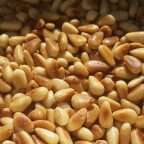Posts Tagged ‘pine nuts buy’

Do Pine Nuts Lower Blood Sugar?
Many people around the world are struggling with medical conditions related to high blood sugar levels, such as diabetes. As a result, a growing number of studies have focused on the role that certain foods and nutrients play in regulating blood sugar levels.
Pine nuts are one such food that has gained interest and attention for its potential to lower blood sugar levels. In this article, we will look at the link between pine nuts and blood sugar levels, examine the existing research on the topic, and provide insights into incorporating pine nuts into a healthy diet.
Understanding Blood Sugar Levels and Its Importance in the Body
Blood sugar, also known as glucose, is a type of sugar that travels through the bloodstream to provide energy to the body’s cells. It is an essential source of fuel for all the body’s functions, including the brain, muscles, and organs.
Why is Blood Sugar Important?
The body tightly regulates blood sugar levels, ensuring that they remain within specific ranges. The reason for this is that too much or too little blood sugar can lead to serious health complications.
When blood sugar levels are too high, it can lead to hyperglycemia, which is a condition that can damage vital organs like the brain and kidneys. At the same time, when blood sugar levels are too low, it can cause hypoglycemia, leading to lightheadedness, seizures, and even unconsciousness.
Blood sugar levels are an essential component of overall health and wellbeing. Understanding how the body’s regulation mechanisms work can help individuals make informed lifestyle choices that support healthy blood sugar levels.
Consultation with healthcare professionals can also play a crucial role in preventing and managing conditions related to blood sugar levels.
What are Pine Nuts?
If you’ve ever enjoyed a pesto sauce or a nutty granola, then chances are you’ve tasted pine nuts. But what exactly are they?
Pine nuts, also known as pignoli, are the edible seeds harvested from pine trees. They’re usually found inside the cones of different species of pine trees, including the stone pine, Korean pine, and piñon pine.
These small, ivory-colored nuts pack a lot of flavor and nutrition into a tiny package.
Let’s explore details about these nuts:
Nutrition
- Pine nuts are a good source of healthy fats, protein, and fiber. They also contain vitamins and minerals like zinc, magnesium, and vitamin E.
- Studies have shown that consuming pine nuts (and other nuts) can reduce the risk of heart disease and lower cholesterol levels.
- Pine nuts are also a low-glycemic-index food, meaning they don’t cause a rapid rise in blood sugar levels. This makes them a good snack option for people with diabetes.
Flavor
- Pine nuts have a rich, buttery flavor with a slightly sweet and nutty taste.
- They have a delicate texture that’s similar to sunflower seeds or almonds.
- Pine nuts are often used in Mediterranean cuisine, especially in dishes like pesto sauce, salads, and baked goods.
Harvesting and Processing
- Pine nuts are generally harvested by hand because the cones need to be opened to access the seeds inside.
- Harvesting and processing pine nuts can be a time-consuming and labor-intensive process, which is why they tend to be more expensive than other types of nuts.
- Once harvested, pine nuts need to be shelled to remove the hard outer shell before they can be eaten.
Uses
- Pine nuts are a versatile ingredient that can be used in many different types of dishes, from savory to sweet.
- They’re a popular ingredient in Mediterranean and Middle Eastern cuisine, but can also be found in dishes from around the world.
- Some popular uses for pine nuts include as a topping for salads, roasted or baked in savory dishes, or blended into desserts like cakes and cookies.
How do Pine Nuts Affect Blood Sugar Levels?
- Several studies have been conducted to explore the link between pine nuts and blood sugar levels. One small study published in the Journal of the Science of Food and Agriculture found that consuming pine nuts with high-carbohydrate meals resulted in lower postprandial blood sugar levels compared to meals without pine nuts.
- Another study conducted by the University of Sydney found that consuming pine nuts as part of a low-glycemic index (GI) diet resulted in lower fasting blood sugar levels compared to a high-GI diet without pine nuts.
- The specific mechanisms by which pine nuts impact blood sugar levels are not yet fully understood. However, it is believed that the fiber, healthy fats, and minerals in pine nuts may play a role in regulating blood sugar levels. For example, the fiber in pine nuts can slow down the absorption of glucose into the bloodstream, reducing the likelihood of spikes in blood sugar levels after meals.
The Active Compounds in Pine Nuts That Affect Blood Sugar Levels
Pine nuts have long been a favorite snack in many cultures. These tiny, creamy-white nuts have a unique flavor and offer a range of health benefits. But did you know that they also contain active compounds that affect blood sugar levels? In this chapter, we will explore these compounds and how they work.
Phytosterols
- Phytosterols are compounds found in plant foods that have a similar chemical structure to cholesterol. However, unlike cholesterol, phytosterols can help reduce cholesterol levels in the body. This is because they block the absorption of cholesterol in the intestines. Pine nuts contain high levels of phytosterols, which can help reduce cholesterol levels and improve overall heart health.
Pinolenic Acid
- Pinolenic acid is a type of fatty acid found only in pine nuts. This fatty acid has been found to have a significant impact on blood sugar levels. Research has shown that pinolenic acid can increase the production of GLP-1, a hormone that helps regulate blood sugar levels. This means that pine nuts may be beneficial for people with diabetes or those at risk of developing it.
Polyphenols
- Polyphenols are a group of compounds found in many plant-based foods, including pine nuts. These compounds have been found to improve insulin sensitivity, which can help regulate blood sugar levels. Polyphenols also have antioxidant properties that can help reduce inflammation and protect against chronic diseases such as heart disease and cancer.
Fiber
- Fiber is an essential nutrient found in plant-based foods, including pine nuts. Fiber is important for overall health, but it also plays a crucial role in regulating blood sugar levels. This is because fiber slows down the absorption of glucose into the bloodstream, preventing blood sugar spikes.
- Pine nuts contain both soluble and insoluble fiber, making them an excellent choice for maintaining healthy blood sugar levels.
The Benefits of Pine Nuts for People with Diabetes
Diabetes is a chronic medical condition that affects millions of people worldwide. It is characterized by high blood sugar levels, which can lead to several health problems. Pine nuts, however, have been found to provide numerous benefits to people with diabetes. Here are the top benefits of pine nuts for people with diabetes:
1. Lowering Blood Sugar Levels
One of the primary benefits of pine nuts for people with diabetes is their ability to lower blood sugar levels. They contain a high amount of magnesium, which helps improve insulin sensitivity and regulate blood sugar levels.
Pine nuts also have a low glycemic index (GI), which means they are slowly absorbed into the bloodstream, causing a gradual rise in blood sugar levels rather than an abrupt spike.
2. Reducing the Risk of Heart Disease
Heart disease is a common complication of diabetes, and people with diabetes are at an increased risk of developing heart disease. However, incorporating pine nuts into your diet can help reduce this risk.
Pine nuts are a rich source of monounsaturated and polyunsaturated fats, both of which are beneficial for heart health. They also contain phytosterols, which have been found to lower cholesterol levels.
3. Decreasing Inflammation
People with diabetes are prone to chronic inflammation, which can lead to various complications. Pine nuts have anti-inflammatory properties and contain a high amount of vitamin E, which is a powerful antioxidant. Vitamin E helps protect cells from damage caused by free radicals, which can cause inflammation.
Pine nuts offer significant benefits for people with diabetes. They can help regulate blood sugar levels, reduce the risk of heart disease, and decrease inflammation. Adding pine nuts to your diet is an excellent way to incorporate a nutritious and delicious food that can help manage your diabetes and improve your overall health.
Other Health Benefits of Pine Nuts
In addition to potentially lowering blood sugar levels, pine nuts have several other health benefits. As previously mentioned, pine nuts are a rich source of healthy fats, including polyunsaturated and monounsaturated fats. These fats have been shown to improve heart health by reducing inflammation and lowering cholesterol levels. Additionally, pine nuts are a great source of protein, an essential nutrient that is important for building and repairing tissues in the body.
Incorporating Pine Nuts Into a Healthy Diet
If you are interested in incorporating pine nuts into your diet for their potential blood sugar-lowering effects, there are several delicious and nutritious ways to do so. Pine nuts can be added to salads, sprinkled over roasted vegetables or used as a tasty topping for oatmeal or yogurt. Additionally, pine nuts can be blended into pestos or used as a nut butter substitute in recipes for a more savory flavor profile.
Conclusion
While more research is needed to fully understand the link between pine nuts and blood sugar levels, preliminary studies suggest that consuming pine nuts may have a positive impact on blood sugar regulation.
Additionally, pine nuts have numerous other health benefits, such as being a good source of healthy fats and protein. Incorporating pine nuts into a healthy diet is an easy and delicious way to boost your overall health and potentially lower your risk of conditions such as type 2 diabetes.
FAQ
How do pine nuts lower blood sugar?
Pine nuts contain certain nutrients that help regulate blood sugar levels. They contain magnesium, which has been shown to improve insulin sensitivity and lower blood sugar levels in people with type 2 diabetes.
Are pine nuts effective in lowering blood sugar in the long term?
Pine nuts are not a magic solution, but can be an effective part of a balanced diet and exercise routine in maintaining healthy blood sugar levels in the long term.
How many pine nuts should I eat to see the benefits?
There is no set number of pine nuts that need to be consumed to see the benefits of blood sugar regulation. However, consuming a handful of pine nuts on a regular basis can be helpful.
Are pine nuts safe for people with diabetes to consume?
Yes, pine nuts are generally safe for people with diabetes to consume. However, it is recommended that individuals with diabetes follow a balanced diet and consult with their healthcare provider before adding pine nuts to their diet.
Can pine nuts be substituted for diabetes medication?
No, pine nuts cannot be substituted for diabetes medication. They can be consumed as a supplement to medication and a healthy diet and exercise routine.
Are there potential side effects of consuming pine nuts for blood sugar control?
Pine nuts are generally safe for consumption, but can cause allergic reactions in some individuals. It is recommended to consult with a healthcare provider before introducing pine nuts to a diet.
Can pine nuts be consumed raw or do they need to be cooked?
Pine nuts can be consumed raw or cooked. They are commonly used in salads or added to dishes as a garnish.
Where can I find pine nuts to incorporate into my diet?
Pine nuts are commonly found online, in health food stores or grocery stores in the nut section. They can be added to salads, granolas, or eaten as a snack.
Can pine nuts be used to prevent the onset of diabetes?
While pine nuts can be an effective part of a balanced diet and exercise routine to maintain healthy blood sugar levels, there is no known cure or prevention for diabetes. It is important to maintain a healthy lifestyle and consult with a healthcare provider for diabetes prevention advice.




